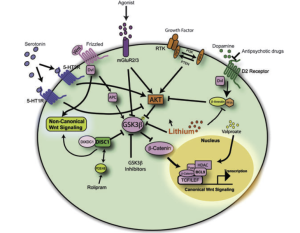
Schizophrenia is hypothesized to be a brain developmental disorder that can be diagnosed or evident in late adolescence or early adulthood. This mental illness disorder can be characterized by hallucinations, delusions, social withdrawal, and cognitive disabilities. The main concern with this disorder is that the onset can be in adolescence childhood, which is a critical period for the brain’s neural development and growth. Therefore, the main question is how do we focus more on prevention along with treatment for Schizophrenia?
In a brain with Schizophrenia it is evident that there is cortical thinning in the superior temporal gyrus and patients with Schizophrenia have a smaller hippocampus, amygdala, thalamus. Suggesting a possible correlation to Alzheimer’s disease as the hippocampus is the first portion of the brain to be affected. Therefore, with a smaller brain volume there is greater lateral and ventricle volumes and as a result greater cerebrospinal fluid. In terms of genes, the protein C4 from a C4 gene on chromosome 6 puts an individual at greater risk for Schizophrenia.
As related to the article, An emerging role for Wnt and GSK3 signaling pathways in schizophrenia, the pathway related to Schizophrenia is the Wnt signaling pathway. This pathway is based in the role it plays in the neural development to adult neural circuit function as it relates to Schizophrenia. During developmental stages patients with schizophrenia may show delays in certain milestones such as problems with neuromotor development, poor performance on cognitive tests, problems with speech, and difficulties in social adjustment. As it relates to development, studies have suggested that there is a correlation between utero and early environmental factors like infection that could play a role during pregnancy in later development of Schizophrenia. Therefore, disrupting fetal brain development from unfortunate events during pregnancy and increasing the risk of child to develop Schizophrenia.
 https://doi.org/10.1111/cge.12111
https://doi.org/10.1111/cge.12111
As briefly discussed in small break out groups, prenatal vitamins were suggested to possibly have part to increase the likelihood of developing schizophrenia in the child later on. However, from a nutrition standpoint prenatal vitamins contain important nutrients such as folic acid or folate that help to drastically decrease the risk of the fetus having spina bifida. On the argument that prenatal vitamins could increase the risk, I question the role folate plays with schizophrenia. As a result in vitro and in vivo studies suggest that folate deficiency increases risk of Schizophrenia in the developing fetus. Considering that with folate deficiency there is also higher levels of homocysteine that can build up in the blood. Homocysteine creates greater risk for not only cardiovascular disease but also negatively impacting brain development from neuronal dysfunction in a developing fetus. Higher homocysteine levels have also been seen in patients with Alzheimer’s disease or other forms of dementia.

Along with this, a prenatal supplement in the nutrition world is understood as a supplement; a supplement should go along with proper nutrition from food otherwise the effects and benefits could be impacted. Nutrition plays a key role in fetal development early on and as a more recently discovered mental illness there is still a lot to learn about Schizophrenia. More research is needed on the topic of when Schizophrenia develops and whether or not there are ways to prevent it or better treat this disorder.
Citations:
Schizophrenia’s strongest known genetic risk deconstructed. NIH, 2016. https://www.nih.gov/news-events/news-releases/schizophrenias-strongest-known-genetic-risk-deconstructed
An emerging role for Wnt and GSK3 signaling pathways in Schizophrenia. Singh, KK. Developmental Biology: Frontiers for clinical genetics, 2013. Wiley Online Library. https://doi.org/10.1111/cge.12111
Childhood developmental abnormalities in Schizophrenia: evidence from high-risk studies. Suvisaari, J., tuulio-Henriksson, A., Lonnqvist, J. Schizophrenia Research, 2003. Science Direct. https://www.sciencedirect.com/science/article/pii/S0920996402002347?via%3Dihub#BIB12
The Origins of Schizophrenia, edited by Alan Brown, and Paul Patterson, Columbia University Press, 2011. ProQuest Ebook Central, https://ebookcentral.proquest.com/lib/cord-ebooks/detail.action?docID=909358.